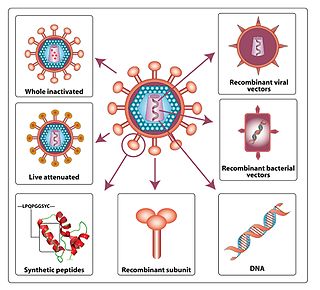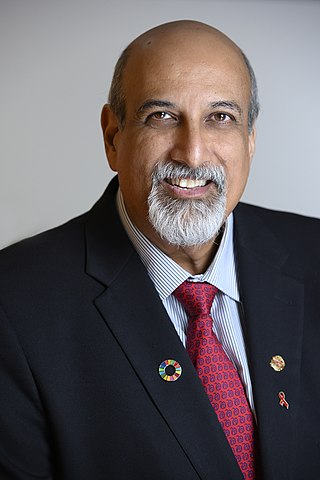
Tuberculosis (TB), also known colloquially as the "white death", or historically as consumption, is an infectious disease usually caused by Mycobacterium tuberculosis (MTB) bacteria. Tuberculosis generally affects the lungs, but it can also affect other parts of the body. Most infections show no symptoms, in which case it is known as latent tuberculosis. Around 10% of latent infections progress to active disease which, if left untreated, kill about half of those affected. Typical symptoms of active TB are chronic cough with blood-containing mucus, fever, night sweats, and weight loss. Infection of other organs can cause a wide range of symptoms.

An HIV vaccine is a potential vaccine that could be either a preventive vaccine or a therapeutic vaccine, which means it would either protect individuals from being infected with HIV or treat HIV-infected individuals. It is thought that an HIV vaccine could either induce an immune response against HIV or consist of preformed antibodies against HIV.

HIV/AIDS originated in the early 20th century and has become a major public health concern and cause of death in many countries. AIDS rates vary significantly between countries, with the majority of cases concentrated in Southern Africa. Although the continent is home to about 15.2 percent of the world's population, more than two-thirds of the total population infected worldwide – approximately 35 million people – were Africans, of whom around 1 million have already died. Eastern and Southern Africa alone accounted for an estimate of 60 percent of all people living with HIV and 100 percent of all AIDS deaths in 2011. The countries of Eastern and Southern Africa are most affected, leading to raised death rates and lowered life expectancy among adults between the ages of 20 and 49 by about twenty years. Furthermore, life expectancy in many parts of Africa is declining, largely as a result of the HIV/AIDS epidemic, with life-expectancy in some countries reaching as low as thirty-nine years.

Tropical medicine is an interdisciplinary branch of medicine that deals with health issues that occur uniquely, are more widespread, or are more difficult to control in tropical and subtropical regions.

Pre-exposure prophylaxis for HIV prevention, commonly known as PrEP, is a form of medication used to prevent HIV infection, the cause of HIV/AIDS.

HIV/AIDS is one of the most serious health concerns in South Africa. South Africa has the highest number of people afflicted with HIV of any country, and the fourth-highest adult HIV prevalence rate, according to the 2019 United Nations statistics. About 8 million South Africans out of the 60 million population live with HIV.
Professor Sheila Dinotshe Tlou is a Botswana nurse, specialist in HIV/AIDS and women's health, and nursing educator. She was Minister of Health from 2004 to 2008. Professor Tlou is a distinguished advocate for human resources for health issues. She is a recognized visionary leader and champion.
The Royal Society Africa Prize has been awarded by the Royal Society since 2006 to African-based researchers at the start of their career who are making innovative contributions to the biological sciences in Africa. £60,000 is awarded as a grant for the recipient to carry out a research project that is linked to an African centre of scientific excellence, normally a University or equivalent research centre, and a further £5,000 is given directly to the prizewinner.
The United States Military HIV Research Program was initiated by the United States Congress in 1986, in reaction to the threat of lost effectiveness of U.S./Allied troops due to HIV infection. The mission of MHRP is to develop an HIV-1 vaccine, provide prevention, care, and treatment, and conduct meaningful HIV/AIDS research for the global community through the President's Emergency Plan for AIDS Relief (PEPFAR). It is centered at the Walter Reed Army Institute of Research (WRAIR), and has established five international research sites in Africa and Asia. MHRP also partners with the Armed Forces Research Institute of Medical Sciences (AFRIMS) in Thailand. MHRP works closely with The Henry M. Jackson Foundation for the Advancement of Military Medicine (HJF), most notably in the development of the RV144 HIV vaccine in Thailand. MHRP is the largest research program supported by the HJF.
The Desmond Tutu HIV Foundation (DTHF) is a nonprofit organization founded to provide treatment for and conduct HIV/AIDS research. It is based in Cape Town, South Africa, and is managed with the Desmond Tutu HIV Centre at the University of Cape Town. The Foundation operates community sites throughout greater Cape Town, providing treatment, testing, and outreach services to at-risk communities.
Zeda Fran Rosenberg is an American microbiologist and epidemiologist, active in HIV biology and prevention. She is the chief executive officer of the International Partnership for Microbicides (IPM). IPM was founded by Rosenberg in 2002 and is a nonprofit organization dedicated to developing microbicides and other innovative HIV prevention products and making them available for women in developing countries.
HIV prevention refers to practices that aim to prevent the spread of the human immunodeficiency virus (HIV). HIV prevention practices may be undertaken by individuals to protect their own health and the health of those in their community, or may be instituted by governments and community-based organizations as public health policies.
The XVIII International AIDS Conference was held in Vienna, Austria from July 18–23, 2010.
The Desmond Tutu TB Centre, also referred to as the DTTC or Desmond Tutu Tuberculosis Centre, is a research facility committed to raising awareness about tuberculosis and providing medical treatment and solutions to TB patients in South Africa. Founded in 2003 by Professor Nulda Beyers as the Centre for Tuberculosis Research and Education, the centre came under the patronage of Archbishop Desmond Tutu, Archbishop of South Africa and former TB survivor and, in 2005, changed its name to reflect the event. Since then, the DTTC has worked alongside Desmond Tutu to combat the health issue of TB in South Africa. It is currently directed by Professor Beyers.

Quarraisha Abdool Karim is an infectious diseases epidemiologist and co-founder and Associate Scientific Director of CAPRISA. She is a Professor in Clinical Epidemiology, Columbia University, New York and Pro-Vice Chancellor for African Health, University of KwaZulu-Natal, South Africa.

Salim S. Abdool Karim, MBChB, MMed, MS(Epi), FFPHM, FFPath (Virol), DipData, PhD, DSc(hc), FRS is a South African public health physician, epidemiologist and virologist who has played a leading role in the AIDS and COVID-19 pandemic. His scientific contributions have impacted the landscape of HIV prevention and treatment, saving thousands of lives.
Elizabeth Anne Bukusi FAAS is a research professor working within the field of obstetrics and gynaecology, and global health. Bukusi's main areas of research focus around sexually transmitted infections, women's health, reproductive health, and HIV care, prevention and treatment. Bukusi is the Chief Research Officer at the Kenya Medical Research Institute (KEMRI) and led a "landmark" study on the use of PrEP in Kenya.
Alash'le Grace Abimiku is a Nigerian executive director of the International Research Centre of Excellence at the Institute of Human Virology Nigeria and a professor of virology at the University of Maryland School of Medicine who takes interest in the prevention and treatment of HIV.
James Gita Hakim, was a Zimbabwean internist, clinical epidemiologist, cardiologist, researcher, university faculty and academic mentor. At the time of his death, he was Professor of Medicine and Former Chair of Internal Medicine at the University of Zimbabwe College of Health Sciences.

Lenacapavir, sold under the brand name Sunlenca, is an antiretroviral medication used to treat HIV/AIDS. It is taken by mouth or by subcutaneous injection.









